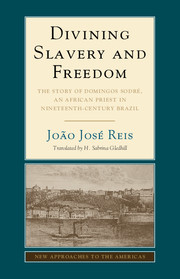 Divining Slavery and Freedom
Divining Slavery and Freedom Book contents
- Frontmatter
- Dedication
- Contents
- Preface
- Abbreviations
- Map
- 1 Cops and Candomblé in Domingos Sodré's Day
- 2 From an African in Onim to a Slave in Bahia
- 3 Domingos Sodré, Diviner
- 4 Witchcraft and Slavery
- 5 Witchcraft and Manumission
- 6 Meet Some Friends of Domingos Sodré
- 7 Domingos Sodré, Ladino Man of Means
- Epilogue
- Timeline of Domingos Sodré's Life
- Glossary
- Appendix 1 Domingos Sodré's Last Will and Testament (1882)
- Appendix 2 Domingos' Manumission and Manumissions Granted by Him
- Appendix 3 Delfina's Petition Guaranteeing Her Mental Health
- Illustration and Map Credits
- Bibliography
- Acknowledgments
- Name Index
- Subject Index
6 - Meet Some Friends of Domingos Sodré
Published online by Cambridge University Press: 05 May 2015
- Frontmatter
- Dedication
- Contents
- Preface
- Abbreviations
- Map
- 1 Cops and Candomblé in Domingos Sodré's Day
- 2 From an African in Onim to a Slave in Bahia
- 3 Domingos Sodré, Diviner
- 4 Witchcraft and Slavery
- 5 Witchcraft and Manumission
- 6 Meet Some Friends of Domingos Sodré
- 7 Domingos Sodré, Ladino Man of Means
- Epilogue
- Timeline of Domingos Sodré's Life
- Glossary
- Appendix 1 Domingos Sodré's Last Will and Testament (1882)
- Appendix 2 Domingos' Manumission and Manumissions Granted by Him
- Appendix 3 Delfina's Petition Guaranteeing Her Mental Health
- Illustration and Map Credits
- Bibliography
- Acknowledgments
- Name Index
- Subject Index
Summary
The police accused two people of consorting with Domingos Sodré in relation to Candomblé in 1862. They were Manoel Joaquim Ricardo and Antão Pereira Teixeira, also African freedmen. In searching the archives, I have found another freedman who enjoyed Domingos' friendship and had been arrested about ten years earlier for running a small Candomblé terreiro in the sugar plantation Recôncavo. His name was Cipriano José Pinto. A summary of the biographies of these three supporting characters, their strategies for survival and success in Bahian society, their victories and defeats, sheds further light on the complex experience of a segment of the African community, the freedpersons or libertos, to which Domingos belonged and in which he circulated. Slave/master relations, family, work, property – including property in slaves – business acumen, intra-African solidarity, competition, and conflict, relations with state authorities, especially the police, spiritual afflictions, and religious affiliations are some of the themes explored in the lives of the three individuals portrayed here. Through them we will further explore the complexities of both slavery and freedom in nineteenth-century Bahia.
MANOEL JOAQUIM RICARDO
João, the young slave arrested in Domingos' home in 1862, belonged to a successful transatlantic merchant, businessman, and slaveholder, Manoel Joaquim Ricardo, a Hausa freedman who then lived in Cruz do Cosme, the rural district ruled by subdelegado João de Azevedo Piapitinga, which was also home to Libânio José de Almeida and others charged with practicing witchcraft and Candomblé in Chapter 1 of this book. Manoel Joaquim, for instance, met Libânio in church, having at least once, in 1862, performed a baptism together in which the latter stood godfather and the former “touched Our Lady's crown” – meaning that the Mother of God was the godmother – on behalf of a creole child. Ricardo, it should be recalled, was a friend and neighbor, but also a compadre of Elias Seixas, who chose him and his wife as the godparents for his baby daughter.
- Type
- Chapter
- Information
- Divining Slavery and FreedomThe Story of Domingos Sodré, an African Priest in Nineteenth-Century Brazil, pp. 210 - 252Publisher: Cambridge University PressPrint publication year: 2015
